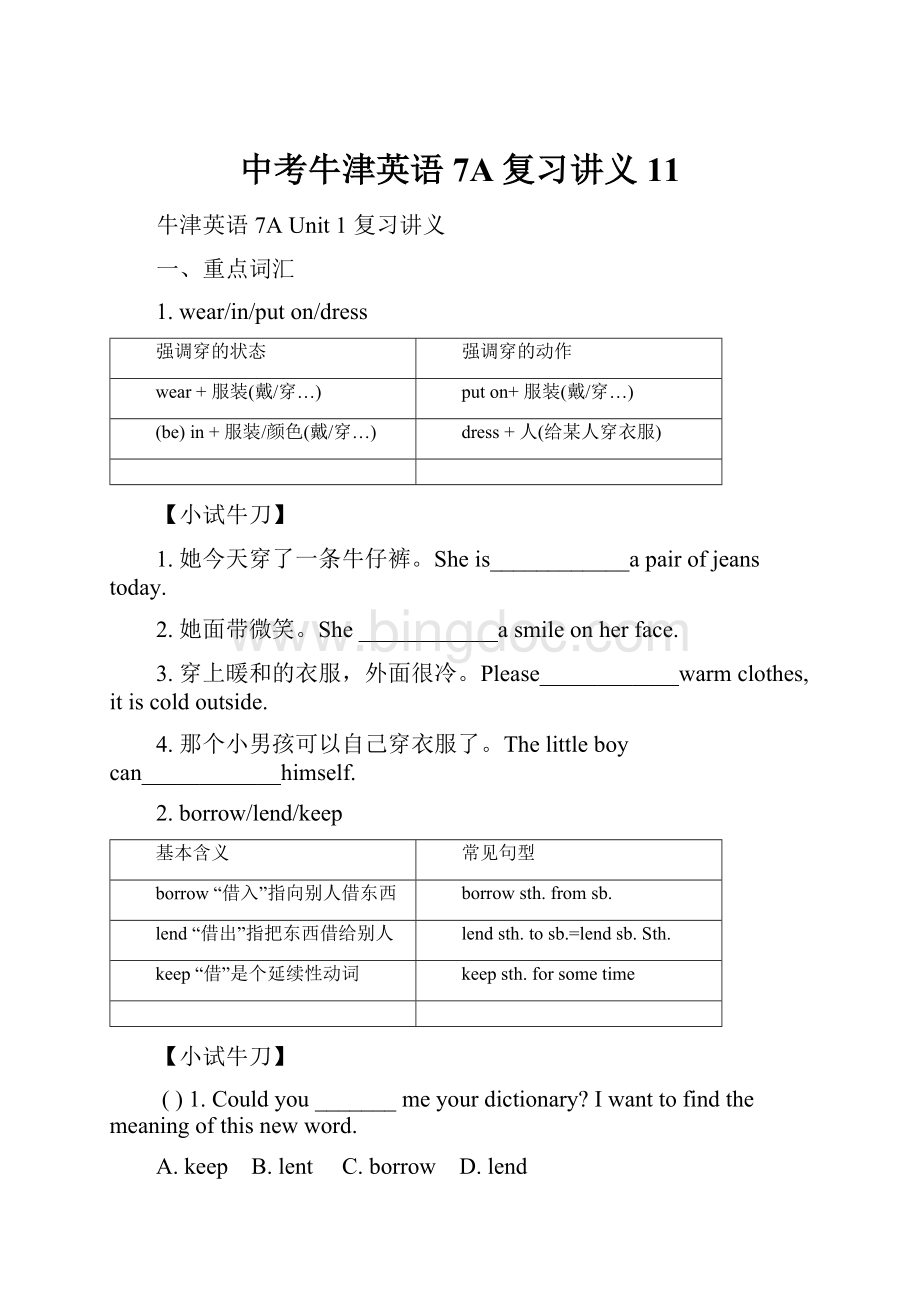中考牛津英语7A复习讲义11.docx
《中考牛津英语7A复习讲义11.docx》由会员分享,可在线阅读,更多相关《中考牛津英语7A复习讲义11.docx(53页珍藏版)》请在冰点文库上搜索。

中考牛津英语7A复习讲义11
牛津英语7AUnit1复习讲义
一、重点词汇
1.wear/in/puton/dress
强调穿的状态
强调穿的动作
wear+服装(戴/穿…)
puton+服装(戴/穿…)
(be)in+服装/颜色(戴/穿…)
dress+人(给某人穿衣服)
【小试牛刀】
1.她今天穿了一条牛仔裤。
Sheis____________apairofjeanstoday.
2.她面带微笑。
She____________asmileonherface.
3.穿上暖和的衣服,外面很冷。
Please____________warmclothes,itiscoldoutside.
4.那个小男孩可以自己穿衣服了。
Thelittleboycan____________himself.
2.borrow/lend/keep
基本含义
常见句型
borrow“借入”指向别人借东西
borrowsth.fromsb.
lend“借出”指把东西借给别人
lendsth.tosb.=lendsb.Sth.
keep“借”是个延续性动词
keepsth.forsometime
【小试牛刀】
()1.Couldyou_______meyourdictionary?
Iwanttofindthemeaningofthisnewword.
A.keepB.lentC.borrowD.lend
()2.Ican______youmydictionary,butyoucan_______itforonlyaweek.
A.borrow;borrowB.lend;borrowC.borrow;keepD.lend;keep
()3.--MayI_______yourbike?
--Certainly,butyoumustn’t_______ittoothers.
A.lend;lendB.borrow;lendC.borrow;borrowD.lend;borrow
()4.I________thisbookfortwoweeks.Ihavetoreturnitnow.
A.borrow B.haveborrowedC.kept D.havekept
3.say/talk/speak/talk
基本含义
常见句型
say“说,讲”,强调说的具体内容
saysth.tosb.
talk“谈话”,强调交谈
talkto/withsb.
speak“说话,发言”还有说某种语言
speaktosb.;speak+语言
tell“告诉,讲述”
tellsb.sth.;tellsb.(not)todosth.
【小试牛刀】
()1. Listen, I have an important thing to ______ you.
A. speak B. say C. talk D. tell
()2. Can you _______ it in Chinese?
A. speak B. say C. tell D. talk
()3. Sit down, children.I’m going to _____ you a story.
A. speak B. talk C. tell D. say
()4. --Does Meimei speak English very well.
--Yes, she and her classmates often ____ to each other in English.
A. speak B. talk C. say D. tell
()5. Hello. May I ________to the headmaster please?
A. speak B. say C. tell D. talk
4.sometimes/sometimes/sometime/sometime
基本含义
记忆口诀
sometimes“有时”
sometimes/sometimes:
相聚是“有时”;分开是“几次”
sometimes“几次”
sometime“在某时”
sometime/sometime:
相聚是“某时”;分开是“一段”
sometime“一段时间”
【小试牛刀】
1.I’llstayherefor____________.
2.Marywillbeback____________inOctober.
3.Ourschoolis____________largerthantheirs.
4.Tomgoestoschoolonfoot,but____________bybike.
二、语法点拨:
一般现在时
(1)基本用法
①经常性或习惯性的动作,常与表示频度的时间状语连用。
时间状语:
every…,sometimes, at…,onSunday
Ileavehomeforschoolat7everymorning.我每天早晨七点离开家去学校。
②客观真理,客观存在,科学事实。
Theearthmovesaroundthesun.地球绕着太阳转。
ShanghailiesintheeastofChina.上海位于中国的东部。
③表示格言或警句中。
Pridegoesbeforeafall.骄者必败。
【注意】此用法如果出现在宾语从句中,即使主句是过去时,从句谓语也要用一般现在时。
Columbusprovedthattheearthisround.哥伦布证实地球是圆的。
④现在时刻的状态、能力、性格、个性。
Idon’twantsomuch.我不想要这么多。
⑤某些动词如come,go,move,stop,leave,arrive,be,finish,continue,start等,在一般现在时句中可用来表示将来肯定会发生的动作。
Thetraincomesat3o’clock.火车将于三点钟来。
⑥在时间状语从句或条件状语从句中,一般现在时代替一般将来时。
I’llhelpyouassoonasyouhaveproblem.你一有问题,我就会帮助你。
TellXiaoLiaboutitifyoumeethim.如何你遇见小李,告诉他这件事。
(2)动词构成①主语+be+adj./其他②主语+行为动词(注意第三人称单数)+其他
(3)句式变化
【小试牛刀】
1.IcantakeLiMingtherewhenhe________(come)tovisit.
2.Herhome__________________________(远离)herschool.
3.Thepot_____________(notlook)likeyoursverymuch.
4.Who_____________(想要)togoswimming?
三、交际用语
①问候
Hello/Hi.
Goodmorning/afternoon/evening.
Nicetomeetyou.
Howareyou?
②询问姓名
What’syourname?
/MayIknowyourname?
MayIhaveyourname?
Mynameis…/Iam…
③询问年龄
Howoldareyou?
/What’syourage?
I’m…(yearsold).
牛津英语7AUnit1短语汇总
序号
Chinese
English
1
读/看这本书
readthisbook
2
照顾
lookafter
3
(与)某人交朋友
makefriends(withsb.)
4
第一天
△thefirstday
5
向某人作自我介绍
△introduceoneselftosb.
6
在七年级一班
inClass1,Grade7=inClassOne,GradeSeven
7
喜爱踢足球
loveplayingfootball
love/like/enjoydoingsth.
喜爱做某事
8
喜欢听音乐
likelisteningtothemusic
9
喜爱玩电脑游戏
enjoyplayingcomputergames
10
来自……
comefrom…=befrom…
11
努力学习(工作)
workhard
12
擅长于…;在…主面做得好
begoodat…=dowellin…
13
在阅读兴趣小组/参加英语兴趣小组
intheReadingClub/intheEnglishClub
14
戴眼镜
wearglasses
15
开始认识这些学生
gettoknowthestudents
16
……的答案
theanswerto…
17
做笔记
makenotes
18
出生
beborn
19
踢足球/打羽毛球
playfootball/badminton
20
在足球场/羽毛球场
onthefootballfield/badmintoncourt
21
在周末
attheweekend
22
在游泳池里
intheswimmingpool
23
去游泳/跑步
goswimming/running
24
步行回家
walkhome=gohomeonfoot
乘公共汽车回家
takethebushome=gohomebybus
乘公共汽车去上学
takethebustoschool=gotoschoolbybus
25
用英语说…(某事)
saysth.inEnglish
26
放风筝
flyakite/flykites
27
在上午/下午/晚上
inthemorning/afternoon/evening
28
带某人去散步
takesb.forawalk
遛狗
takethedogforawalk
29
与某人谈话
talkto/withsb.
30
谈论某事
talkaboutsth.
31
为黄河足球队效力
playforHuangheFootballTeam
32
为我们校足球队进球得分
scoreforourschoolfootballteam
33
进球得分
scoregoals
34
看起来很强壮/高兴(系表)
lookstrong/lookhappy
听起来很好(系表结构)
soundgreat
35
在下一次世界杯
inthenextWorldCup
36
和他人合作
workwithothers
37
半小时
halfanhour
38
将某物遗忘在某地
△leavesth.sp.
39
练习做某事
△practicedoingsth.
40
需要做某事
△needtodosth.
牛津英语7AUnit1基础训练
一、重点词组
1.十二岁大________________2.住在一个套房________________
3.擅长数学________________4.在校篮球队________________
5.在阅读兴趣小组________________6.来自________________
7.出生________________8.相当高________________
9.听音乐________________10.工作刻苦努力________________
11.留着短发________________12.戴着眼镜________________
13.喜欢玩电脑游戏________________14.足球场________________
15.世界杯________________16.寻找,搜索________________
17.长大________________18.彼此,互相________________
二、句型结构
1.YoucancallmeSimon.(双宾语结构)
1)我们喊她鲁茜。
We________________________Lucy.
2)--你们把它们称为什么?
--光盘。
--______________________youcall__________?
--CDs.
2.Shewalkshomeafterschool./Shegoeshomeonfootafterschool.
(各种交通方式的表达以及同义句转换)
1)他经常坐火车去上海。
HeoftengoestoShanghai________________________.
Heoften____________________________________toShanghai.
2)他爸爸每天骑车上班。
Hisfathergoestowalk________________________everyday.
Hisfather_________________________________toworkeveryday.
3)她妈妈有时乘飞机去广东。
Sometimes,hermothergoestoGuangdong______________________.
Sometimes,hermother________________________Guangdong.
3.HowdoyousaythatinEnglish?
(注意say,speak,tell,ask用法上的区别)
1)妈妈经常对我说:
“你一定要好好学习。
”
Mumoften______________________me,“Youmustworkhard.”
2)吉姆英语讲得很好.Jimcan_______________________verywell.
3)我外祖父经常给我讲故事。
Mygrandfatheroften____________mestories.
4)我能问你一个问题吗?
MayI____________youaquestion?
三、难点语法
一般现在时
我们使用一般现在时当我们谈论 1)客观真理 2)现在的事情 3)我们经常性做的事情
1)猫吃鱼。
Cats____________fish.
2)米莉现在住在北京的一个公寓房里吗?
___________Millie____________inaflatinBeijing?
3)在周末,我爸爸通常跑步半小时。
Attheweekend,myfatherusually________________________forhalfanhour.
4)你现在是阅读兴趣小组的一员吗?
___________youamemberoftheReadingClub?
5)我不是每天在晚饭后带我的狗散步。
I________________________mydogforawalkaftersuppereveryday.
牛津英语7AUnit2复习讲义
一、重点词汇
1.wakeup
该短语属于“动词+副词”结构,后接人称代词作宾语时,则置于它们的中间;后接名词作宾语时,则可置于它们的中间,也可置于短语之后。
Ifheisstillsleeping,don’t________________(叫醒他).
It’stimetogotoschool.__________________(把汤姆叫醒),please.
2.spend/take/cost/pay
基本含义
常见句型
spend“花费”时间、金钱
人+spend+钱/时间+on+物
人+spend+时间+(in)doingsth.
take“花费”时间
Ittakes+人+时间+todosth.
cost“值”钱;“花费”钱
物+cost+人+钱
物+cost+钱
pay“付”钱
人+pay+钱+for+物
【小试牛刀】
1.--Howlong_______it______youtofinishthework?
--Forabouttwodays.
2.Itwill________you£50toflytoBeijing.
3.Ihave__________alldaylookingformybrother.
4.--_______you_______fourdollarsforthebook?
--No,Ididn’t.
3.both/either/neither
基本含义
常见句型
both“两者”,可以位于句首或句中,用于否定句中,表示部分否定
Both…and...(既…又…,两个都)连接两个并列主语时,谓语动词用复数形式
either“两者之一”,位于句首作主语时,谓语动词用单数形式
Either…or…(或者…或者…,不是…就是)连接两个并列主语时,谓语动词实行“就近原则”,即和or后的词一致
neither“两者一个也不”,位于句首作主语时,谓语动词用单数,是个完全否定形式
Neither…or…(既不…也不…;…”,“…和…都不)连接两个并列主语时,谓语动词实行“就近原则”,即和nor后的词一致
【小试牛刀】
1.Therearemanytalltreeson________sidesofthestreet.
2.Hegavemetwoanswerstothequestion,but________ofthemisright.
3.--Whenshallwemeet,thiseveningortomorrowmorning?
--Idon’tmind.________timeisOK.
4.except/exceptfor/besides
except“除去”,往往和all,every,no,nobody,nothing等词连用
AllarepresentexceptTom.除汤姆外,其他人都到了。
exceptfor“把某一点除外”,是对前面的主谓意思进行补充说明,有时可以和except互换,但位于句首时,只用exceptfor
ExceptforGeorge,wecanallgo.除乔治外,我们都可以去。
Your composition is good except for some spelling mistakes.
除了一些拼写错误外,你的作文是很好的。
besides“除…以外,另外还有”
TwootherboyswereondutybesidesTom.
除汤姆外,还有两个男孩值日。
except that和 except意思一样,但后接的是一个句子
The young soldier stood still except that his mouth was moving.
【小试牛刀】
1.Hegetsupearlyeveryday_____________Sunday.
2.Weneedfifteenmorepeople_____________ourteamtodothejob.
3.We could do nothing _____________ wait.
4.Thesuitfittedhimwell_____________ thecolourwasalittlebrighter.
5.Janewasquitealoneintheworld_____________ anauntinBrazil.
二、语法点拨:
人称代词
1.人称代词的人称、数和格。
第一人称
第二人称
第三人称
单数
复数
单数
复数
单数
复数
主格
I
we
you
you
he/she/it
they
宾格
me
us
you
you
him/her/it
them
2.人称代词有主格和宾格之分。
通常主格作主语,宾格作宾语。
如:
Iliketabletennis.(作主语)
Doyouknowhim?
(作宾语)
3.人称代词还可作表语。
作表语时用宾格。
如:
--Whoisknockingatthedoor?
--It’sme.
4.称代词在than之后与其他人或事物进行比较时,用主格和宾格都可以。
如:
Heisolderthanme.
HeisolderthanIam.
【小试牛刀】
1. __________ is my aunt. We often visit __________(she).
2. China is a developing country. _________(its)is in the east of Asia.
3